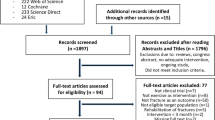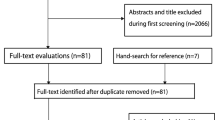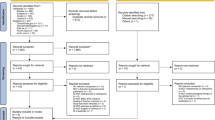Abstract
Summary
In this meta-analysis, we evaluated the effect of exercise on fracture reduction in the elderly. Our results determined a significantly positive effect on overall fractures, whereas the possibility of a publication bias indicates the need for well-designed (multi-center) trials that generate enough power to focus on osteoporotic fractures.
Introduction
The preventive effect of exercise on fracture incidence has not been clearly determined yet. Thus, the purpose of this study is to evaluate the effectiveness of exercise in preventing overall and vertebral fractures in older adults by meta-analyses technique.
Methods
This study followed the PRISMA recommendations for systematic reviews and meta-analyses. A systematic review of English articles between 1980 and March 2012 was performed. Terms used were: “exercise”, “fractures”, “bone”, “falls”, “osteoporosis”, “BMD”, “BMC”, “bone turnover”, while the search was limited to “clinical trial” and “humans”. Controlled exercise trials that reported fracture number as endpoint or observation in subjects 45 years and older were included.
Results
Ten controlled exercise trials that reported overall fractures and three exercise trials that reported vertebral fractures met our inclusion criteria. Overall fracture number in the exercise group was 36 (n = 754) compared with 73 fractures in the CG (n = 670) (relative risk [RR] = 0.49; 95 % confidence interval [CI], 0.31–0.76). No significant heterogeneity of trial results (p = 0.28; I 2 = 17) was determined; however, there was some evidence to suggest a publication bias. The overall RR for vertebral fracture number (0.56; 95 % CI, 0.30–1.04) (EG: 19 fractures/103 subjects vs. CG: 31 fractures/102 subjects) was borderline non-significant while the heterogeneity of trial results also cannot be ruled out.
Conclusion
Although there is evidence that exercise reduces overall and, to a lesser degree, vertebral fractures in the elderly, the possibility of publication bias weakens our result and demonstrates the imperative for large exercise studies with dedicated exercise protocols that focus on fractures as a primary endpoint.




Similar content being viewed by others
References
Burge R, Dawson-Hughes B, Solomon DH, Wong JB, King A, Tosteson A (2007) Incidence and economic burden of osteoporosis-related fractures in the United States, 2005–2025. J Bone Miner Res 22:465–475
Cummings SR, Melton LJ (2002) Epidemiology and outcomes of osteoporotic fractures. Lancet 359:1761–1767
Cooper C, Cole ZA, Holroyd CR, Earl SC, Harvey NC, Dennison EM, Melton LJ, Cummings SR, Kanis JA (2011) Secular trends in the incidence of hip and other osteoporotic fractures. Osteoporos Int 22:1277–1288
Gregg EW, Cauley JA, Seeley DG, Ensrud KE, Bauer DC (1998) Physical activity and osteoporotic fracture risk in older women. Study of Osteoporotic Fractures Research Group. Ann Intern Med 129:81–88
Silman AJ, O’Neill TW, Cooper C, Kanis J, Felsenberg D (1997) Influence of physical activity on vertebral deformity in men and women: results from the European Vertebral Osteoporosis Study. J Bone Miner Res 12:813–819
Gregg EW, Pereira MA, Caspersen CJ (2000) Physical activity, falls, and fractures among older adults: a review of the epidemiologic evidence. J Am Geriatr Soc 48:883–893
Karlsson MK, Nordqvist A, Karlsson C (2008) Physical activity, muscle function, falls and fractures. Food Nutr Res 52:1–7
Moayyeri A (2008) The association between physical activity and osteoporotic fractures: a review of the evidence and implications for future research. Ann Epidemiol 18:827–835
Kemmler W, von Stengel S (2011) Exercise and osteoporosis-related fractures: perspectives and recommendations of the sports and exercise scientist. Physician Sportmed 39:142–157
Gillespie LD, Robertson MC, Gillespie WJ, Lamb SE, Gates S, Cumming RG, Rowe BH (2009) Interventions for preventing falls in older people living in the community. Cochrane Database Syst Rev:CD007146
Howe TE, Shea B, Dawson LJ, Downie F, Murray A, Ross C, Harbour RT, Caldwell LM, Creed G (2011) Exercise for preventing and treating osteoporosis in postmenopausal women. Cochrane Database Syst Rev:CD000333
Jarvinen TL, Sievanen H, Khan KM, Heinonen A, Kannus P (2008) Shifting the focus in fracture prevention from osteoporosis to falls. BMJ 336:124–126
Sambrook PN, Cameron ID, Chen JS, Cumming RG, Lord SR, March LM, Schwarz J, Seibel MJ, Simpson JM (2007) Influence of fall related factors and bone strength on fracture risk in the frail elderly. Osteoporos Int 18:603–610
Kemmler W, von Stengel S, Engelke K, Haberle L, Kalender WA (2010) Exercise effects on bone mineral density, falls, coronary risk factors, and health care costs in older women: the randomized controlled senior fitness and prevention (SEFIP) study. Arch Intern Med 170:179–185
Korpelainen R, Keinanen-Kiukaanniemi S, Heikkinen J, Vaananen K, Korpelainen J (2006) Effects of impact exercise on bone mineral density in elderly women with low BMD: a population based randomized controlled 30-month intervention. Osteoporos Int 17:109–118
Moher D, Liberati A, Tetzlaff J, Altman DG (2009) Preferred reporting items for systematic reviews and meta-analyses: the PRISMA statement. Ann Intern Med 151(264–9):W64
Sherrington C, Herbert RD, Maher CG, Moseley AM (2000) PEDro. A database of randomized trials and systematic reviews in physiotherapy. Man Ther 5:223–226
Maher CG, Sherrington C, Herbert RD, Moseley AM, Elkins M (2003) Reliability of the PEDro scale for rating quality of randomized controlled trials. Phys Ther 83:713–721
DerSimonian R, Laird N (1986) Meta-analysis in clinical trials. Control Clin Trials 7:177–188
Higgins JP, Thompson SG, Deeks JJ, Altman DG (2003) Measuring inconsistency in meta-analyses. BMJ 327:557–560
Moher D, Pham B, Jones A, Cook DJ, Jadad AR, Moher M, Tugwell P, Klassen TP (1998) Does quality of reports of randomised trials affect estimates of intervention efficacy reported in meta-analyses? Lancet 352:609–613
de Morton NA (2009) The PEDro scale is a valid measure of the methodological quality of clinical trials: a demographic study. Aust j physiother 55:129–133
Higgins JPT, Green S (2011) Cochrane handbook for systematic reviews of interventions. www.cochrane-handbook.org
Egger M, Davey Smith G, Schneider M, Minder C (1997) Bias in meta-analysis detected by a simple, graphical test. BMJ 315:629–634
Begg CB, Mazumdar M (1994) Operating characteristics of a rank correlation test for publication bias. Biometrics 50:1088–1101
Sterne JA, Sutton AJ, Ioannidis JP et al (2011) Recommendations for examining and interpreting funnel plot asymmetry in meta-analyses of randomised controlled trials. BMJ 343:d4002
Lau J, Ioannidis JP, Schmid CH (1997) Quantitative synthesis in systematic reviews. Ann Intern Med 127:820–826
Korpelainen R, Keinanen-Kiukaanniemi S, Nieminen P, Heikkinen J, Vaananen K, Korpelainen J (2010) Long-term outcomes of exercise: follow-up of a randomized trial in older women with osteopenia. Arch Intern Med 170:1548–1556
Karinkanta S, Heinonen A, Sievanen H, Uusi-Rasi K, Fogelholm M, Kannus P (2009) Maintenance of exercise-induced benefits in physical functioning and bone among elderly women. Osteoporos Int 20:665–674
Karinkanta S, Heinonen A, Sievanen H, Uusi-Rasi K, Pasanen M, Ojala K, Fogelholm M, Kannus P (2007) A multi-component exercise regimen to prevent functional decline and bone fragility in home-dwelling elderly women: randomized, controlled trial. Osteoporos Int 18:453–462
Ebrahim SB, Thompson PW, Baskaran V, Evans K (1997) Randomized placebo controlled trial of brisk walking in the prevention of postmenopausal osteoporosis. Age Aging 26:252–260
Kemmler W, von Stengel S, Bebenek M, Engelke K, Hentschke C, Kalender WA (2012) Exercise and fractures in postmenopausal women: 12-year results of the Erlangen Fitness and Osteoporosis Prevention Study (EFOPS). Osteoporos Int 23:1267–1276
McMurdo ME, Mole PA, Paterson CR (1997) Controlled trial of weight bearing exercise in older women in relation to bone density and falls. BMJ 314:569
Ashburn A, Fazakarley L, Ballinger C, Pickering R, McLellan LD, Fitton C (2007) A randomised controlled trial of a home based exercise programme to reduce the risk of falling among people with Parkinson’s disease. J Neurol Neurosurg Psychiatry 78:678–684
Robertson MC, Devlin N, Gardner MM, Campbell AJ (2001) Effectiveness and economic evaluation of a nurse delivered home exercise programme to prevent falls: 1. Randomised controlled trial. BMJ 322:697–701
Chan K, Qin L, Lau M, Woo J, Au S, Choy W, Lee K, Lee S (2004) A randomized, prospective study of the effects of Tai Chi Chun exercise on bone mineral density in postmenopausal women. Arch Phys Med Rehabil 85:717–722
Sinaki M, Itoi E, Wahner HW, Wollan PC, Gelczer RK, Mullan BP, Collins DA, Hodgson SF (2002) Stronger back muscles reduce the incidence of vertebral fractures: a prospective 10 year follow-up of postmenopausal women. Bone 30:836–841
Preisinger E, Alacamlioglu Y, Pils K, Bosina E, Metka M, Schneider B, Ernst E (1996) Exercise therapy for osteoporosis: results of a randomised controlled trial. Br J Sports Med 30:209–212
Korpelainen R, Keinanen-Kiukaanniemi S, Heikkinen J, Vaananen K, Korpelainen J (2006) Effect of exercise on extraskeletal risk factors for hip fractures in elderly women with low BMD: a population-based randomized controlled trial. J Bone Miner Res 21:772–779
Sinaki M, Wahner HW, Offord KP, Hodgson SF (1989) Efficacy of nonloading exercises in prevention of vertebral bone loss in postmenopausal women: a controlled trial. Mayo Clin Proc 64:762–769
Hopewell S, Loudon K, Clarke MJ, Oxman AD, Dickersin K (2009) Publication bias in clinical trials due to statistical significance or direction of trial results. Cochrane Database Syst Rev:MR000006
Shephard RJ (2002) Ethics in exercise science research. Sports Med 32:169–183
Juni P, Altman DG, Egger M (2001) Systematic reviews in health care: assessing the quality of controlled clinical trials. BMJ 323:42–46
Campbell AJ, Robertson MC, Gardner MM, Norton RN, Tilyard MW, Buchner DM (1997) Randomised controlled trial of a general practice programme of home based exercise to prevent falls in elderly women. BMJ 315:1065–1069
Campbell AJ, Robertson MC, Gardner MM, Norton RN, Buchner DM (1999) Falls prevention over 2 years: a randomized controlled trial in women 80 years and older. Age Ageing 28:513–518
Robertson MC, Gardner MM, Devlin N, McGee R, Campbell AJ (2001) Effectiveness and economic evaluation of a nurse delivered home exercise programme to prevent falls: 2. Controlled trial in multiple centres. BMJ 322:701–704
Preisinger E, Kerschan-Schindl K, Wober C, Kollmitzer J, Ebenbichler G, Hamwi A, Bieglmayer C, Kaider A (2001) The effect of calisthenic home exercises on postmenopausal fractures—a long-term observational study. Maturitas 40:61–67
Acknowledgments
We gratefully acknowledge the support of the Elsbeth-Bonhoff Stiftung (Berlin, Germany). We would also like to thank Christina Weigert for her kind assistance in identifying relevant studies.
Conflicts of interest
None.
Author information
Authors and Affiliations
Corresponding author
Appendix
Appendix
Rights and permissions
About this article
Cite this article
Kemmler, W., Häberle, L. & von Stengel, S. Effects of exercise on fracture reduction in older adults. Osteoporos Int 24, 1937–1950 (2013). https://doi.org/10.1007/s00198-012-2248-7
Received:
Accepted:
Published:
Issue Date:
DOI: https://doi.org/10.1007/s00198-012-2248-7




